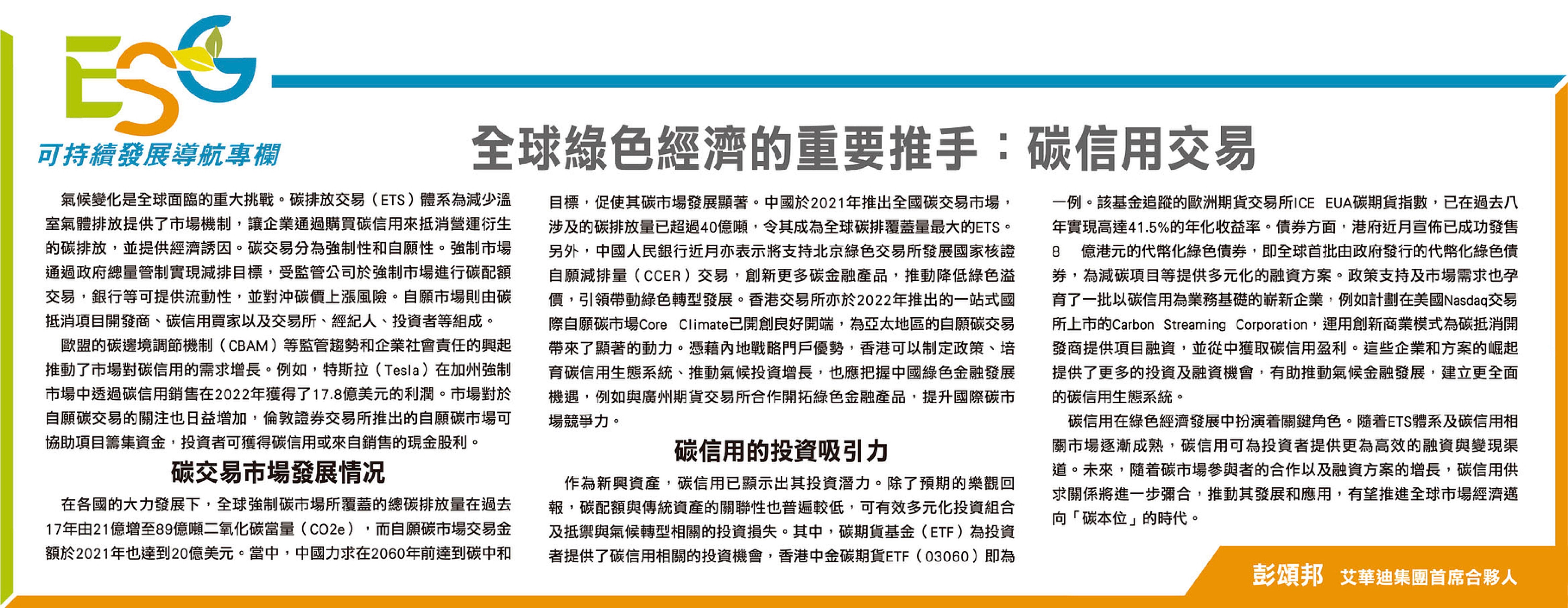AVISTA [Ming Pao Column] Series: Carbon Credit Trading - A Key Driver for the Global Green Economy
Original article (only available in Chinese) : 全球綠色經濟的重要推手:碳信用交易 | 明報

Climate change is a major challenge that the world is facing today. The Emissions Trading System (ETS) provides a market mechanism for reducing greenhouse gas emissions by enabling companies to offset their carbon emissions generated from operations by purchasing carbon credits while offering economic incentives. Carbon markets can be divided into mandatory and voluntary markets. Mandatory markets achieve emission reduction targets through government-imposed caps, with regulated companies participating in carbon quota trading. Banks and other institutions can provide liquidity and hedge against the risk of rising carbon prices. The voluntary market consists of carbon offset project developers, carbon credit buyers, exchanges, brokers, and investors.
Regulatory trends such as the European Union's Carbon Border Adjustment Mechanism (CBAM) and the rise of corporate social responsibility have driven the soaring demand for carbon credits. For example, Tesla generated a profit of USD 1.78 billion in 2022 by selling carbon credits in California's mandatory market. Market interest in voluntary carbon trading is also growing, with the London Stock Exchange launching a voluntary carbon market to help projects raise funds, enabling investors to obtain carbon credits or cash dividends from sales.
The Current State of Carbon Markets
Driven by strong efforts from countries worldwide, the total carbon emissions covered by the global mandatory carbon market have grown from 2.1 billion to 8.9 billion tonnes of CO2 equivalent (tCO2e) in the past 17 years, with the voluntary carbon market reaching a transaction value of USD 2 billion in 2021. China's goal of achieving carbon neutrality by 2060 has greatly accelerated its carbon market development. In 2021, China launched a national carbon market covering over 4 billion tonnes of carbon emissions, making it the world's largest ETS in terms of emissions coverage. Additionally, the People's Bank of China recently announced its support for the China Beijing Green Exchange to develop China Certified Emissions Reduction (CCER) trading, promote the creation of more carbon financial products, reduce green premiums, and drive the green transition. The Hong Kong Stock Exchange's one-stop international voluntary carbon market, Core Climate, launched in 2022, has also made a strong start, providing significant momentum to voluntary carbon trading in the Asia-Pacific region. Leveraging its strategic gateway advantage, Hong Kong can formulate policies, cultivate carbon credit ecosystems, promote climate investment growth, and seize green finance development opportunities in China, such as cooperating with the Guangzhou Futures Exchange to develop green financial products and enhance its competitiveness in the international carbon market.
HKEx luanched a one-stop international voluntary carbon market, Core Climate in 2022
The Investment Appeal of Carbon Credits
As an emerging asset, carbon credits have already demonstrated their investment potential. In addition to optimistic expected returns, carbon allowances generally have lower correlations with traditional assets, making them an effective tool for diversifying investment portfolios and hedging against climate transition-related investment losses. Among these, Carbon futures exchange-traded funds (ETF) offer investors with carbon credit-related investment opportunities, such as Hong Kong’s CICC Carbon Futures ETF (03060). This fund tracks the ICE EUA Carbon Futures Index of the Eurex Exchange and has achieved an annualized return of 41.5% over the past 8 years. In the bond market, the Hong Kong government recently announced the successful issuance of HKD 800 million in tokenized green bonds, the world's first tokenized green bonds issued by a government, providing diversified financing solutions for decarbonization projects. Policy support and market demand have also given rise to innovative companies based on carbon credits, such as Carbon Streaming Corporation, which plans to be listed on the Nasdaq Stock Exchange in the United States, using an innovative business model to provide project financing for carbon offset developers and profit from carbon credits. The emergence of these companies and schemes provides more investment and financing opportunities, contributing to the development of climate finance and building a more comprehensive carbon credit ecosystem.
Carbon credits play a vital role in the development of the green economy. As the ETS and carbon markets mature, carbon credits will be able to offer investors with more efficient financing and monetization channels. In the future, with the increasing collaboration among carbon market participants and the growth of financing solutions, the supply and demand of carbon credits will further converge, promoting their development and application, ultimately advancing the global market economy towards a sustainable "carbon-centric" era.
Meet Our People

VINCENT PANG
Managing Partner
AVISTA GROUP
vincent.pang@avaval.com

SABRINA LAM
Director
RISK MANAGEMENT ADVISORY
sabrina.lam@avaval.com
Date: 19 Apr 2023 | Tags: ESG

